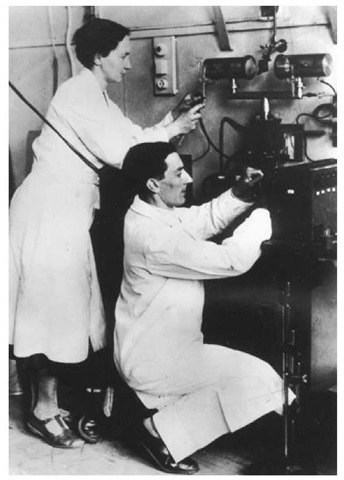Irene Joliot-Curie collaborated with her husband, Jean Frederic Joliot-Curie, in the discovery of artificial synthesis for radioactive material and the discovery of the neutron. For these advances, the wife and husband couple was awarded the 1935 Nobel Prize in chemistry.
Curie was born on September 12, 1897, in Paris, the daughter of the Nobel laureate physicists Pierre and Marie Curie. She followed in their footsteps by studying under the Faculty of Science at the University of Paris. She served in World War I as a nurse radiographer. After the war, she joined her mother as an assistant at the Institute of Radium. While working in that laboratory, she conducted her research on alpha rays of polonium that served as the locus of her doctoral dissertation. She was hooded as a doctor of science in 1925.
Irene met Frederic Joliot when he was also an assistant at the Institute of Radium, and the couple married in 1926. They had two children together, one daughter named Helene and one son named Pierre. They fused not only their personal lives but also their professional lives, conducting much of their research in tandem. Together, they discovered that stable elements could be destabilized to create radioactive material artificially. In 1933, they bombarded alpha particles at the stable element boron, which created a radioactive compound of nitrogen. They jointly published their results in the 1934 paper, "Production artificielle d’elements radioact-ifs: Preuve chimique de la transmutation des elements." The Nobel Committee recognized the profound implications of their discovery by awarding both Joliot-Curies the Nobel Prize in chemistry for 1935.
The Faculty of Science in Paris had appointed her as a lecturer in 1932, and in 1937 it conferred on her the title of professor. The year before, the French government had named her undersecretary of state for scientific research. In 1938, Joliot-Curie’s research on the behavior of heavy element neutrons opened up one door on the way to the discovery of nuclear fission. The next year, the Legion of Honor inducted her as an officer. During World War II, Frederic led the underground resistance movement as the president of the Front National.
Irene Joliot-Curie and her husband, Frederic, were jointly awarded the 1935 Nobel Prize in chemistry for their discovery of artificial radioactivity.
After the war, Irene succeeded her mother as the director of the Institute of Radium. Also in 1946, she was named a commissioner for atomic energy, a position she retained for six years, during which France amassed its first atomic stockpile. After the war, she worked to promote peace as a member of the World Peace Council. She also contributed her energy to women’s rights as a member of the Comite National de I’Union des Femmes Frangaises.
As with her mother, Marie Curie, who died from sustained overexposure to radiation, Irene Joliot-Curie also died from overexposure to radiation throughout her entire life. She contracted leukemia and died in Paris on March 17, 1956. Her husband succeeded her as director of the Institute of Radium. He also continued to oversee the construction of the 160 MeV synchrocyclotron at the new center for nuclear physics in Orsay, a project she had commenced before dying.

